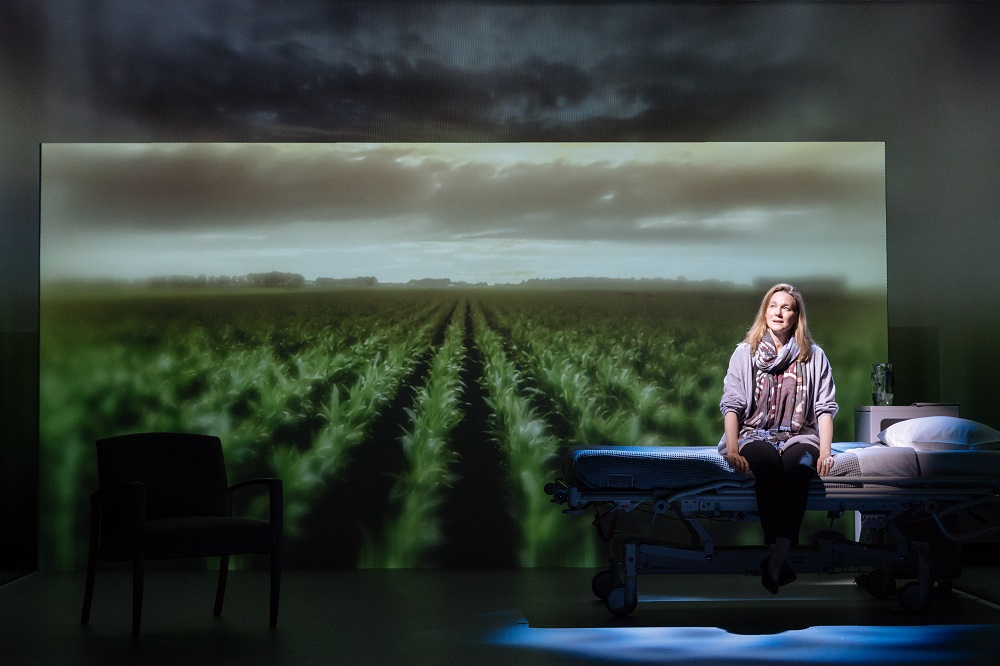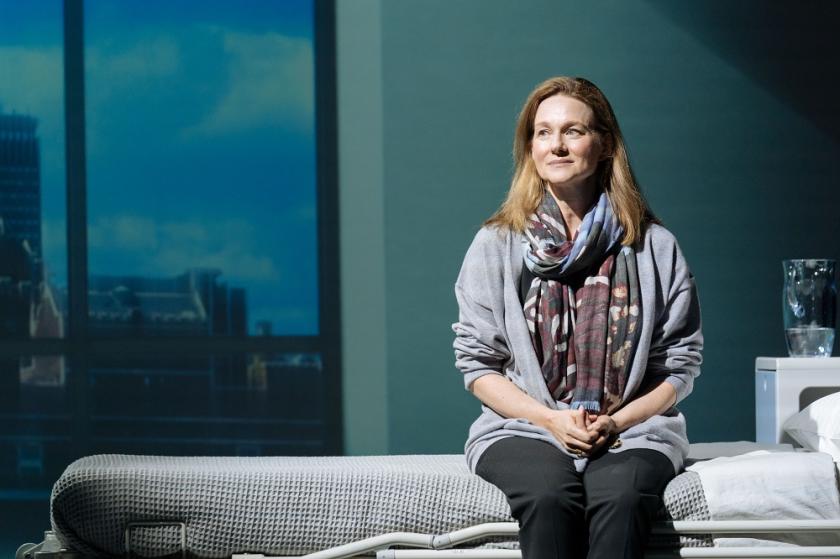In Harold Pinter’s memory play Old Times, one of the women declares, “There are some things one remembers even though they may never have happened.” Elizabeth Strout’s heroine in My Name Is Lucy Barton is in the reverse position. When it comes to the difficult childhood she has long since escaped, she’s uncertain of what she can – or wants to – remember, yet she is anything but the standard issue unreliable narrator. In Richard Eyre’s flawless production at the Bridge Theatre, Strout’s writing, as adapted by Rona Munro and performed by a luminous Laura Linney, pulls off the considerable trick of rendering doubt unerringly truthful.
Part of Strout’s achievement in her immensely well-regarded 2016 novel is her creation and control of so vivid a tone of voice for her eponymous narrator, Lucy Barton. On the surface the “plot” is simple: Lucy tells the story of a nine-week stay she had, years ago, in a New York midtown hospital in which, to her surprise, she was visited by her mother whom she had not seen in years. The visit was in the 1980s when Lucy feels she was a different woman from the one she is now. What was it that she did or didn’t understand back then? Who is responsible for the development of her emotions, her fears and her future as a writer?
Female confrontation across the generations is a Hollywood staple from Mildred Pierce through Mommie, Dearest to Terms of Endearment and beyond, but this is no mother/daughter smackdown cliché. Both the book and the play are exquisitely quiet, unfashionably calm and utterly riveting. Cheap emotional climaxes are replaced by a slowly unfurling, properly complicated portrait of a woman who wants to understand the relationships that, for better and worse, formed her.
Most stories are slow to start but Eyre paces the opening with such impressively focused energy that you don’t notice how necessarily expository much of the initial material is. And with Linney immediately so seemingly relaxed and in command of her character’s present and past, she simply wins over the audience without ever stooping to woo them. Achieving that on the wide open space of Bob Crowley’s elegant, grey open stage with audiences wrapped round on three sides is particularly impressive. Linney and Eyre refuse to anticipate or foreshadow troubles ahead. Even John Leonard’s soundscape – one part realistic sound effects to one part woozy instrumental writing – resists the temptation to nudge the audience towards a specific mood. This, mercifully, is not a production in which heavily signalling underscoring mistakes subtext for the text itself. But then the entire production team pays the audience the compliment of believing they can concentrate hard enough to fill in the carefully constructed gaps in the consummately skilled telling and, crucially, the tale itself. What exactly did go on in Lucy’s dirt-poor home? Why is her father so removed from the story? Why the estrangement from her siblings?
Linney and Eyre refuse to anticipate or foreshadow troubles ahead. Even John Leonard’s soundscape – one part realistic sound effects to one part woozy instrumental writing – resists the temptation to nudge the audience towards a specific mood. This, mercifully, is not a production in which heavily signalling underscoring mistakes subtext for the text itself. But then the entire production team pays the audience the compliment of believing they can concentrate hard enough to fill in the carefully constructed gaps in the consummately skilled telling and, crucially, the tale itself. What exactly did go on in Lucy’s dirt-poor home? Why is her father so removed from the story? Why the estrangement from her siblings?
A lesser writer would have come up with The Big Reveal – a moment of understanding and reversal – but Strout is much more ambitious. She’s interested less in what we know about our past than in what and how we guess, what we discern and how we draw upon pain to lead our lives.
With the narrator already so present in the novel, it is no disrespect to say that, on the surface, Munro’s job is closer to that of an editor than a dramatist. Yet she has reordered and distilled the material perfectly to allow an actor to inhabit both the character and the play’s ideas. Seizing the text and mining it for truth, Linney also finds plenty of space for humour, both self-deprecating and as a device for humanising her withholding, ruthless unsentimental mother. She amusingly shows the latter by simply compressing her body, finding taut physical angles alongside a pinched sound and comically strong Illinois accent.
One final element holds everything in perfect balance. Peter Mumford’s lighting not only controls the space but with his highly expressive use of colour – eerie deep blue, warm purple, near-amber sunlight – he quietly sets the emotional temperature for scenes located by Luke Halls’ quasi-literal, beautifully abstracted video designs showing, say, the cornfields of home and the Chrysler building outside Lucy’s hospital window. Video is often overly dominant in contemporary design but Halls and Eyre ensure images surreptitiously melt and flow, thus allowing Mumford the latitude to intensify mood and emotion while always allowing Linney to lead the scene.
What impresses most is Linney’s timing and the meticulous placing of detail. Throughout the intermissionless 90 minutes, you feel you are being spoken to, never spoken at. Linney’s stillness alone makes this one of the finest, least “actorly" performances in town.















Add comment